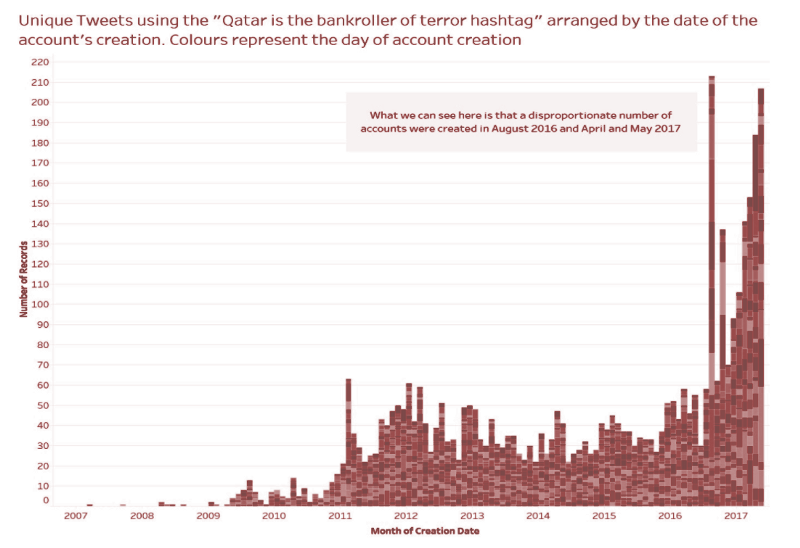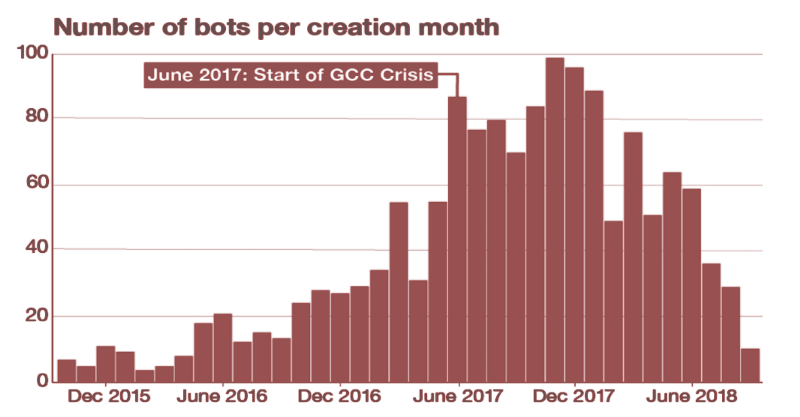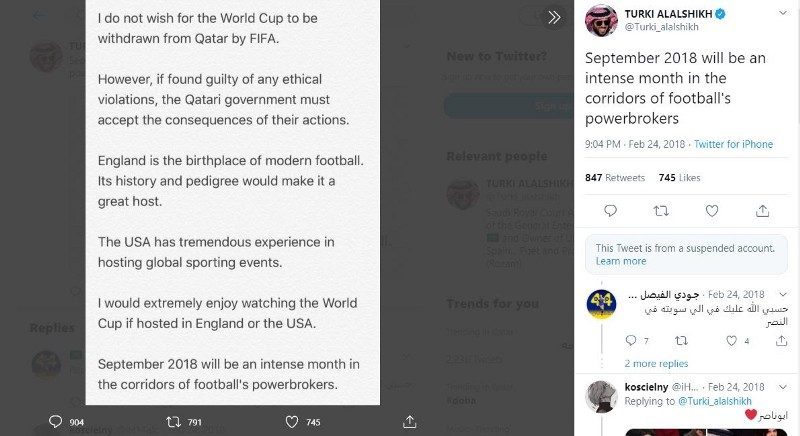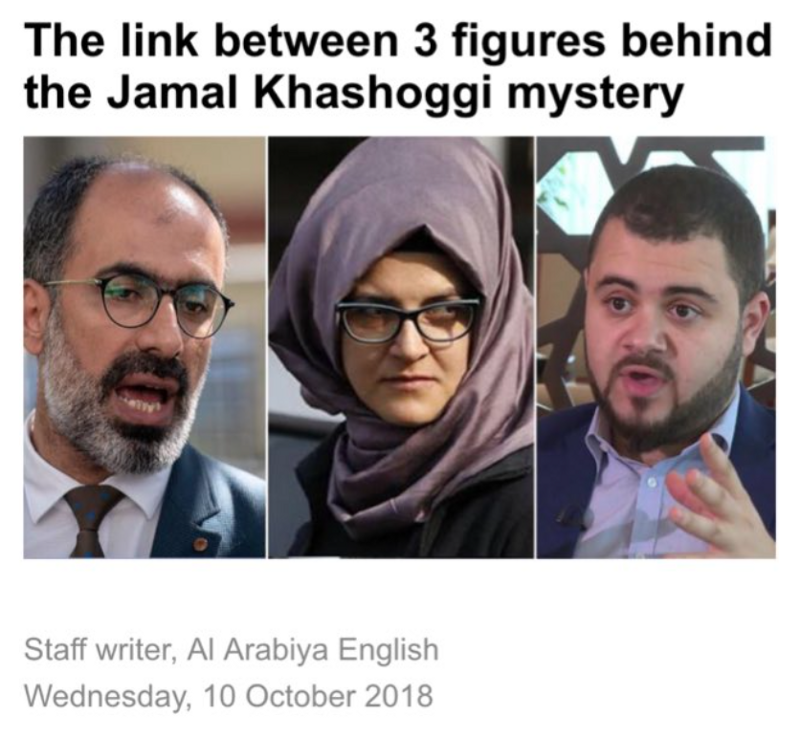by Muhammad Muneeb Ur Rehman
As Qatar marks three years under blockade, here are ten of the most bizarre fake news stories cooked up by the nation’s adversaries.

Monday, June 5, 2017 was a dark day for Doha, as several of our Middle Eastern neighbours announced they were cutting all ties. But darker still was the propaganda drive that began in the months before blockading countries decided to economically and politically isolate Qatar.
As if citing events from an alternate, fictional reality, some prominent media outlets in the Gulf region began an insidious campaign of fake news.
In tribute to Qatar’s resilience and spirit, we present the ten most bizarre fake news stories we’ve seen in three years of blockade. Some have been dubbed by digital media experts as ‘absurd; of comedic nature.’
Comedic? We’ll let you make up your own mind.
1. Act I Scene I: Qatar News Agency hacked and made-up comments attributed to Qatar’s ruler
It’s spring 2017 and the stage is set, with anti-Qatar rhetoric trending on Saudi Twitter thanks to a legion of bots tweeting under an Arabic hashtag that translates to ‘Qatar bankrolls terrorism’.”.
On May 24, Qatar News Agency’s website is hacked and fabricated statements attributed to the country’s Amir, Sheikh Tamim bin Hamad Al-Thani, are published. The cyberattack lasts three hours and uses compromised QNA accounts across different online platforms to promote anti-Qatar propaganda.
The hacking is soon linked to a Saudi piracy cell, while the IP addresses used likely originate from the UAE.

2. Great fiction needs legendary villains: Iran’s Revolutionary Guards at Al Wajba Palace
Two days after Saudi Arabia, the UAE, Bahrain and Egypt announce that they are blockading Qatar by air, land and sea, Saudi-owned news channel Al Arabiya, which is based in the UAE, runs an almost impressively imaginative ‘news’ story.
According to the website, Iran’s Revolutionary Guard (IRG) are protecting Sheikh Tamim inside his palace in Doha. To add credibility to the claim, Al Arabiya uses a real photo of IRG personnel — the only problem though, the photo was from 2011 and the other minor detail, it was actually taken in Iran.
Throwing journalistic integrity to the wind, many news websites from the blockading countries pick up the false story and run with it.
Surely any legitimate news outlet would remove such a far-fetched article and apologise once realising their embarrassing mistake, right? Not Al Arabiya.
3. Deserted in the desert: Is Hamad International Airport ever really empty?
Outside of the recent COVID-19 lockdown, HIA is known by Qatar residents as a pretty crowded place. However, in June 2017, Al Arabiya posted its own spin on that fact.
Seeking to stir up controversy, the site posted a few pictures of the lesser-used sections of the airport along with a false story about how the hub had been deserted since the blockade.
The latest update on this article came in May 20, 2020, amidst the current pandemic. And guess what? Some of the photos were updated, and Lamp Bear looks sad.
4. Doctoring the public opinion: The Qatar Insider goes live, and who needs Wikileaks when there’s Qatarileaks?!
On June 27, 2017, a new website was launched to ‘provide up-to-date details on the turmoil in Qatar.’ This site, named The Qatar Insider, used hashtags like #QatarCrisis to fuel a fake narrative of Qatar’s plight.
The Qatar Insider was advertised in the USA in a $2.6 million campaign funded by the Saudi-American Public Relations Affairs Committee via the (now-defunct) Washington-based lobbying firm, Podesta Group. On top of that, some Egyptian media outlets have since owned-up to involvement in The Qatar Insider, as well as propaganda site Qatarileaks.
Amidst relentless social media wars and online fakery, the blockading countries continue to try and change public opinion about Qatar. Stories that followed June’s false-fact frenzy were even more bizarre, but at least provided a good laugh for those Qatari residents and citizens who knew the truth.

5. The new norm: UAE channel openly lies on national TV
The weirdness continued when, on August 21, 2017, Dubai TV aired a story claiming that anti-government demonstrations had taken place in Doha. Troops, bizarrely said to include Turkish soldiers, had allegedly used tear gas against protestors.
In the broadcast, reporter Maryam Al Awadhi said: “Turkish troops have been deployed on key street intersections of Doha, Qatar, in response to demonstrations by Qatari citizens.”
Although the story was soon shown to be fake, just one day later, Al Arabiya claimed that Qataris had ‘flooded’ twitter with hashtags calling on Qatar’s ruler to step down.
6. A ludicrous demand: Move the 2022 FIFA World Cup to Riyadh
On October 6, 2017, BBC Sport reported that a row had developed over a ‘risk report’. The report allegedly claimed an increasing worry that Qatar might not host the World Cup in 2022.
This ‘risk report’ was allegedly published at the behest of blockading countries, and Saudi immediately latched on to the idea that Qatar could be stripped of the tournament.
Fast forward to spring 2018 and Saudi’s Turki Al-Alshikh, General Sports Authority Chairman, tweeted some wishful thinking.

Before you could say ‘Twitter storm’, Al-Alshikh’s words were spun by a Saudi news website and shared on Dubai-based TV channels. Voila! The FIFA World Cup Finals were on their way out of Doha — at least in the alternate reality of the blockading countries.
Rumours that Qatar would lose hosting rights got so severe that FIFA released an official statement trashing the fake Saudi news, and reinforcing the fact Qatar would not be stripped of its host status.
7. Saudi speaks on your behalf: the US abandons military base in Qatar (except it doesn’t)
On March 12, 2018, Gulf News and other media outlets from the blockading countries started publishing false stories about the relocation of Al Udeid airbase — one of the biggest US military bases in the Middle East.
Meanwhile, later that month, the US military denied all rumours of abandoning Al Udeid and, in fact, were found to be embarking on a massive expansion of the facility.
Al Udeid is now arguably the most significant US military base in the Middle East.
8. The toxic relationship: Egypt Today is a hound for fake stories.
Remember Qatarileaks and its relationship with Egypt Today?
On September 3, 2018, Qatarileaks posted a false story with a video clip about Qataris fleeing ‘repression, detention and torture’ under Sheikh Tamim’s made-up crackdown. These imaginary Qataris, who were scared because of the ‘imminent’ collapse of Doha, were reported to be looking for a safer place.
The video clip was deleted, but Egypt Today’s story remains. It goes on to claim that Qatar has shown no interest in solving the strife.
Stories of this sort come out regularly from the blockading countries, generally with no basis at all in fact. Another fun example is from Emirati news outlet Al Ain, which claims 6,000 Qataris lost their citizenship.* Shrugs*.
9. Murder mystery: Claims that Al Jazeera made up the Khashoggi affair
On October 10, 2018, Al Arabiya and its allies tried to put an unusual spin on the murder of Saudi journalist Jamal Khashoggi, after Al Jazeera reported on the story.
Al Jazeera’s detailed coverage of the murder was spun off as fake news by mainstream Saudi and Emirati media outlets who continued to deny the fact that he was killed in Riyadh’s consulate in Istanbul. Instead they claimed that he had simply ‘gone missing’ and that an Al-Jazeera reporter had conspired with Khashoggi’s fiance and friend to tarnish the Kingdom’s image by making up the story of the journalists being killed.
It was only a matter of days before the world began to figure out what really happened inside the Saudi consulate in Turkey.
Al Arabiya took down the story, but the remnants can still be found online.

10. And the cherry on top: the coup that never was
A worrying rumour emerged in early May 2020, as claims of a coup against Qatar’s Amir began trending on Twitter. Reports of military aircraft, gunfire at the palace and intrigue among Qatar’s ruling elite circulated, with one mysterious Twitter account posting ‘real’ footage from Al Wakra.
On top of the doctored videos and fake Twitter accounts — dubbed ‘sock puppets’ by one expert — hashtags were used again, with #CoupInQatar originating from Saudi users.
As many residents of Al Wakra began searching the neighbourhood for signs of this alleged uprising, the real origin of the video emerged. Any guesses?
That’s right — the ‘gunfire’ and smoke was in fact from Al Wasmi Garden Festival’s firework display, filmed in February this year.
Also, the scriptwriters in Riyadh and Abudhabi might want to start using Google Maps, because the Al-Wajba Palace is nowhere near Al-Wakra!
What are your funniest fake news stories since the blockade began? Let us know






